情态动词can may must need及练习
- 格式:doc
- 大小:38.00 KB
- 文档页数:8
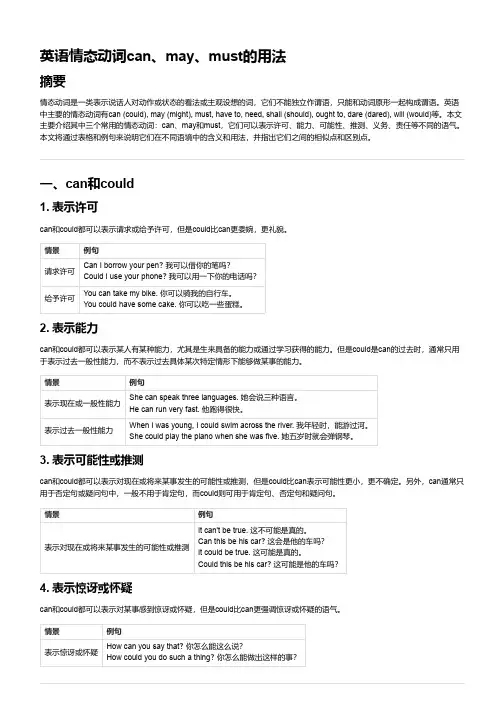
英语情态动词can、may、must的用法摘要情态动词是一类表示说话人对动作或状态的看法或主观设想的词,它们不能独立作谓语,只能和动词原形一起构成谓语。
英语中主要的情态动词有can (could), may (might), must, have to, need, shall (should), ought to, dare (dared), will (would)等。
本文主要介绍其中三个常用的情态动词:can、may和must,它们可以表示许可、能力、可能性、推测、义务、责任等不同的语气。
本文将通过表格和例句来说明它们在不同语境中的含义和用法,并指出它们之间的相似点和区别点。
一、can和could1. 表示许可can和could都可以表示请求或给予许可,但是could比can更委婉,更礼貌。
情景例句请求许可Can I borrow your pen? 我可以借你的笔吗?Could I use your phone? 我可以用一下你的电话吗?给予许可You can take my bike. 你可以骑我的自行车。
You could have some cake. 你可以吃一些蛋糕。
2. 表示能力can和could都可以表示某人有某种能力,尤其是生来具备的能力或通过学习获得的能力。
但是could是can的过去时,通常只用于表示过去一般性能力,而不表示过去具体某次特定情形下能够做某事的能力。
情景例句表示现在或一般性能力She can speak three languages. 她会说三种语言。
He can run very fast. 他跑得很快。
表示过去一般性能力When I was young, I could swim across the river. 我年轻时,能游过河。
She could play the piano when she was five. 她五岁时就会弹钢琴。
3. 表示可能性或推测can和could都可以表示对现在或将来某事发生的可能性或推测,但是could比can表示可能性更小,更不确定。
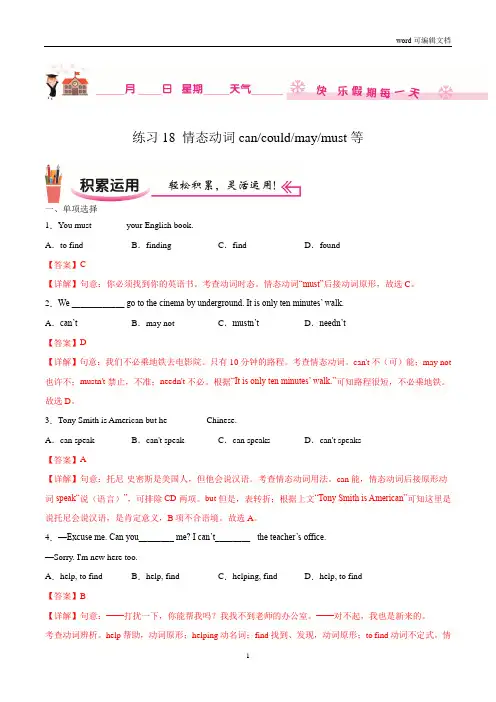
练习18 情态动词can/could/may/must等一、单项选择1.You must________your English book.A.to find B.finding C.find D.found【答案】C【详解】句意:你必须找到你的英语书。
考查动词时态。
情态动词“must”后接动词原形,故选C。
2.We ____________ go to the cinema by underground. It is only ten minutes’ walk.A.can’t B.may not C.mustn’t D.needn’t【答案】D【详解】句意:我们不必乘地铁去电影院。
只有10分钟的路程。
考查情态动词。
can't不(可)能;may not 也许不;mustn't禁止,不准;needn't不必。
根据“It is only ten minutes’ walk.”可知路程很短,不必乘地铁。
故选D。
3.Tony Smith is American but he ________ Chinese.A.can speak B.can't speak C.can speaks D.can't speaks【答案】A【详解】句意:托尼·史密斯是美国人,但他会说汉语。
考查情态动词用法。
can能,情态动词后接原形动词speak“说(语言)”,可排除CD两项。
but但是,表转折;根据上文“Tony Smith is American”可知这里是说托尼会说汉语,是肯定意义,B项不合语境。
故选A。
4.—Excuse me. Can you________ me? I can’t________ the teacher’s office.—Sorry. I'm new here too.A.help, to find B.help, find C.helping, find D.help, to find【答案】B【详解】句意:——打扰一下,你能帮我吗?我找不到老师的办公室。
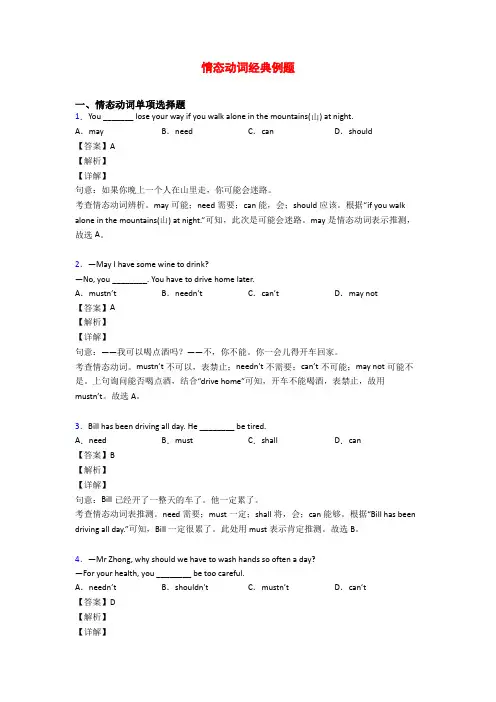
情态动词经典例题一、情态动词单项选择题1.You _______ lose your way if you walk alone in the mountains(山) at night.A.may B.need C.can D.should【答案】A【解析】【详解】句意:如果你晚上一个人在山里走,你可能会迷路。
考查情态动词辨析。
may可能;need需要;can能,会;should应该。
根据“if you walk alone in the mountains(山) at night.”可知,此次是可能会迷路。
may是情态动词表示推测,故选A。
2.—May I have some wine to drink?—No, you ________. You have to drive home later.A.mustn’t B.needn’t C.can’t D.may not【答案】A【解析】【详解】句意:——我可以喝点酒吗?——不,你不能。
你一会儿得开车回家。
考查情态动词。
mustn’t不可以,表禁止;needn’t不需要;can’t不可能;may not可能不是。
上句询问能否喝点酒,结合“drive home”可知,开车不能喝酒,表禁止,故用mustn’t。
故选A。
3.Bill has been driving all day. He ________ be tired.A.need B.must C.shall D.can【答案】B【解析】【详解】句意:Bill已经开了一整天的车了。
他一定累了。
考查情态动词表推测。
need需要;must一定;shall将,会;can能够。
根据“Bill has been driving all day.”可知,Bill一定很累了。
此处用must表示肯定推测。
故选B。
4.—Mr Zhong, why should we have to wash hands so often a day?—For your health, you ________ be too careful.A.needn’t B.shouldn’t C.mustn’t D.can’t【答案】D【解析】【详解】句意:——钟老师,为什么我们一天要洗手这么勤?——为了你的健康,你再怎么小心也不为过。
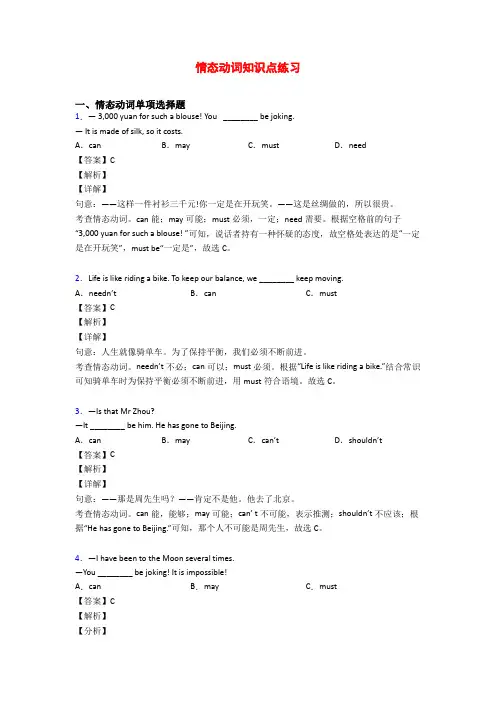
情态动词知识点练习一、情态动词单项选择题1.— 3,000 yuan for such a blouse! You ________ be joking.— It is made of silk, so it costs.A.can B.may C.must D.need【答案】C【解析】【详解】句意:——这样一件衬衫三千元!你一定是在开玩笑。
——这是丝绸做的,所以很贵。
考查情态动词。
can能;may可能;must必须,一定;need需要。
根据空格前的句子“3,000 yuan for such a blouse! ”可知,说话者持有一种怀疑的态度,故空格处表达的是“一定是在开玩笑”,must be“一定是”,故选C。
2.Life is like riding a bike. To keep our balance, we ________ keep moving.A.needn’t B.can C.must【答案】C【解析】【详解】句意:人生就像骑单车。
为了保持平衡,我们必须不断前进。
考查情态动词。
needn’t不必;can可以;must必须。
根据“Life is like riding a bike.”结合常识可知骑单车时为保持平衡必须不断前进,用must符合语境。
故选C。
3.—Is that Mr Zhou?—It ________ be him. He has gone to Beijing.A.can B.may C.can’t D.shouldn’t【答案】C【解析】【详解】句意:——那是周先生吗?——肯定不是他。
他去了北京。
考查情态动词。
can能,能够;may可能;can’ t不可能,表示推测;shouldn’t不应该;根据“He has gone to Beijing.”可知,那个人不可能是周先生,故选C。
4.—I have been to the Moon several times.—You ________ be joking! It is impossible!A.can B.may C.must【答案】C【解析】【分析】句意:——我已经到月球好几次了。
![[need的用法]can、may、must、need的用法](https://uimg.taocdn.com/7c3e1b0ba200a6c30c22590102020740be1ecd3c.webp)
[need的用法]can、may、must、need的用法篇一: can、may、must、need的用法can、may、must、need的用法can①表示能力,“能,会”。
[)Eg : Can you play basketball?②表示怀疑,猜测,常用于否定句或疑问句。
Eg :Li hua can’t be in the classroom.③表示请求,允许,多用于口语,译“可以”= may.Eg: you can go now.④can 开头的疑问句,肯定句,否定句用can或can’t.may①表示推测,“可能,也许”,用于肯定句。
Eg: He may come tomorrow.②表示请求,“许可,可以”。
Eg:May I borrow your book?注:表示请求,许可时,主语为第一人称的一般疑问句,否定回答用mustn’t“不可以,禁止,不许”,不用may not“可能不”。
③表示祝愿。
Eg :May you success.must①表示“必须,应该”。
②表示推测“一定”。
Eg:There is someone knocking at the door.It must be Jim.③否定句中,mustn’t 表示禁止,“不允许”。
④以must 开头的疑问句,肯定句回答用must,否定回答用needn’t , 表示“不需要,不必”=“don’t have to”.⑤表示“偏偏”。
Eg: Must you play the piano at this time.need①情态动词:+do,用need 提问或回答,肯定句回答用must ,否定句回答用needn’t.Eg: Y ou needn’t come to school so early.②实义动词:+to do ,用助动词提问和否定。
③+doing 表示被动。
④needn’t have done 表示没必要做某事但是做了。

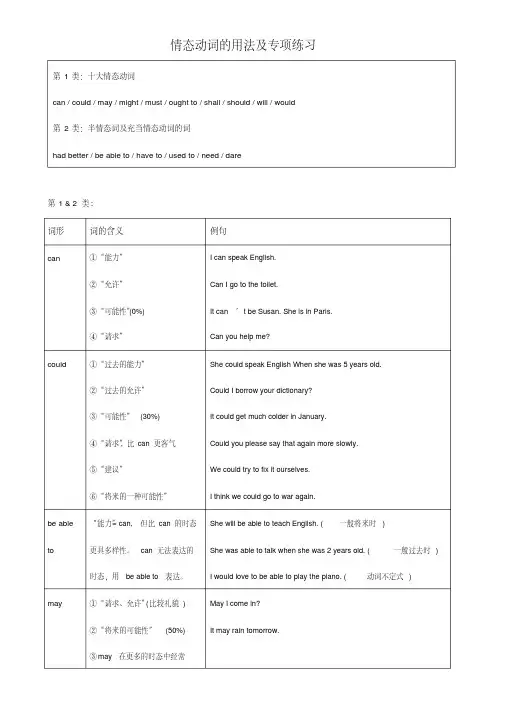
情态动词的用法及专项练习第1 & 2类:词形词的含义例句can ①“能力”②“允许”③“可能性”(0%)④“请求”I can speak English.Can I go to the toilet.It can’t be Susan. She is in Paris. Can you help me?could ①“过去的能力”②“过去的允许”③“可能性”(30%)④“请求”, 比can更客气⑤“建议”⑥“将来的一种可能性”She could speak English When she was 5 years old. Could I borrow your dictionary?It could get much colder in January.Could you please say that again more slowly.We could try to fix it ourselves.I think we could go to war again.be able to “能力”= can, 但比can的时态更具多样性。
can无法表达的时态,用be able to表达。
She will be able to teach English. (一般将来时)She was able to talk when she was 2 years old. (一般过去时)I would love to be able to play the piano. (动词不定式)may ①“请求、允许”(比较礼貌)②“将来的可能性”(50%)③may 在更多的时态中经常May I come in?It may rain tomorrow.第1类:十大情态动词can / could / may / might / must / ought to / shall / should / will / would 第2类:半情态词及充当情态动词的词had better / be able to / have to / used to / need / dare用be allowed to来代替might “较小的可能性”(≤30%)I might move to Canada some day.must ①“必须”(责任、义务)②“可能性”(推测) (100%)③“禁止”(否定式) Everyone must pay taxes.She didn’t arrive. She must be sick.You mustn’t p l ay with fire. It’s dangerous.have to ①“必须、不得不”(客观上不得不做)②多种时态里面代替“must”,因must只有一般现在,但have to 可以有多种时态。
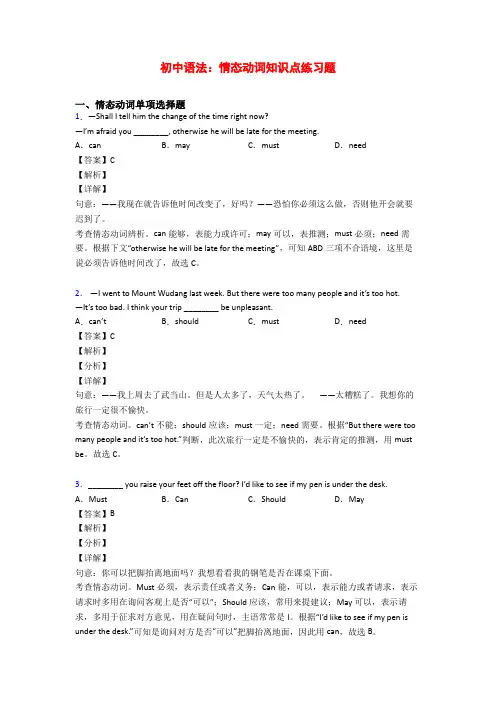
初中语法:情态动词知识点练习题一、情态动词单项选择题1.—Shall I tell him the change of the time right now?—I’m afraid you ________, otherwise he will be late for the meeting.A.can B.may C.must D.need【答案】C【解析】【详解】句意:——我现在就告诉他时间改变了,好吗?——恐怕你必须这么做,否则他开会就要迟到了。
考查情态动词辨析。
can能够,表能力或许可;may可以,表推测;must必须;need需要。
根据下文“otherwise he will be late for the meeting”,可知ABD三项不合语境,这里是说必须告诉他时间改了,故选C。
2.—I went to Mount Wudang last week. But there were too many people and it’s too hot.—It’s too bad. I think your trip ________ be unpleasant.A.c an’t B.should C.must D.need【答案】C【解析】【分析】【详解】句意:——我上周去了武当山。
但是人太多了,天气太热了。
——太糟糕了。
我想你的旅行一定很不愉快。
考查情态动词。
can’t不能;should应该;must一定;need需要。
根据“But there were too many people and it’s too hot.”判断,此次旅行一定是不愉快的,表示肯定的推测,用must be。
故选C。
3.________ you raise yo ur feet off the floor? I’d like to see if my pen is under the desk. A.Must B.Can C.Should D.May【答案】B【解析】【分析】【详解】句意:你可以把脚抬离地面吗?我想看看我的钢笔是否在课桌下面。

考点二:情态动词can 的用法,表示某人能做某事。
肯定句:主语+can+动词原形+其他I can play the piano .否定句:主语+can +not(can’t)+动词原形+其他I can not (can’t) play the piano .一般疑问句:Can +主语+动词原形+其他?Can you play the piano?特殊疑问句:特殊疑问词+ can +主语+动词原形+其他?What can you play ?can play the piano情态动词must, can, could, may, might表推测的用法:情态动词中的must, can, could, may, might都表推测。
其中must的可能性最大,can / could次之,may / might最小。
具体用法如下:1. must的用法(1)表示推测“可能性”时,意思是“一定、准是”,语气较肯定,较有把握。
He must be American. = It is certain that he is American. 他准是个美国人。
(2)must表推测只能用于肯定句。
如果要表示“一定不、肯定不”的意思时,应用can`t,如询问某种可能时,应用can。
He must know my address. 他肯定知道我的地址。
(一定)He can`t know my address. 他肯定不知道我的地址。
(一定不)Can he know my address? 他知道我的地址吗?(询问可能性)(3)must表示推测时,可以推测现在/正在发生的动作/过去发生的动作。
He must have a car now. (现在)他一定有辆小汽车。
He must be doing his exercises in the classroom.(正在进行)他一定在教室里做练习。
He must have finished the work.(过去发生)他一定已完成了工作。
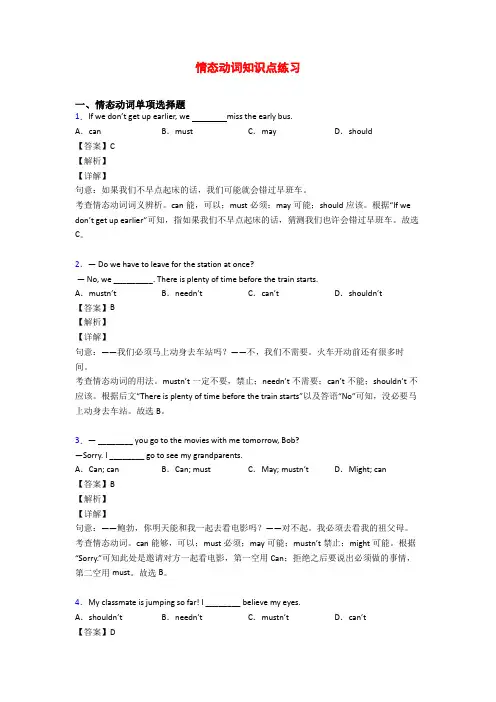
情态动词知识点练习一、情态动词单项选择题1.If we don’t get up earlier, we miss the early bus.A.can B.must C.may D.should【答案】C【解析】【详解】句意:如果我们不早点起床的话,我们可能就会错过早班车。
考查情态动词词义辨析。
can能,可以;must必须;may可能;should应该。
根据“If we don’t get up earlier”可知,指如果我们不早点起床的话,猜测我们也许会错过早班车。
故选C。
2.— Do we have to leave for the station at once?— No, we _________. There is plenty of time before the train starts.A.mustn’t B.needn’t C.can’t D.shouldn’t【答案】B【解析】【详解】句意:——我们必须马上动身去车站吗?——不,我们不需要。
火车开动前还有很多时间。
考查情态动词的用法。
mustn’t一定不要,禁止;needn’t不需要;c an’t不能;shouldn’t不应该。
根据后文“There is plenty of time before the train starts”以及答语“No”可知,没必要马上动身去车站。
故选B。
3.— ________ you go to the movies with me tomorrow, Bob?—Sorry. I ________ go to see my grandparents.A.Can; can B.Can; must C.May; mustn’t D.Might; can【答案】B【解析】【详解】句意:——鲍勃,你明天能和我一起去看电影吗?——对不起。
我必须去看我的祖父母。
考查情态动词。
can能够,可以;must必须;may可能;mustn’t禁止;might可能。

初二英语上册情态动词can、may、must详细用法归纳与考点考点一:can,may,must 等情态动词在陈述句中的用法:1. can 的用法:(1)表示能力、许可、可能性。
表示能力时一般译为“能、会”,即有种能力,尤其是生来具备的能力.如:She can swim fast, but I can’t . 她能游得很快,但我不能。
I can see with my eyes. 我用眼睛看。
could是can的过去式。
表示过去的能力。
be able to do sth. 常常指经过努力,花费了时间和劳力之后才能做到某事。
is/am/are able to do sth was/were able to do sth.(2)表示许可,常在口语中。
如:You can use my dictionary. 你可以用我的字典。
(3)表示推测,可能性,意为“可能”,常用于否定句和疑问句中,此时can’t 译为“ 不可能”。
如:Can the news be true? 这个消息会是真的吗?—Can it be our teacher?那个人有可能是我们老师吗?—No, it can’t be our teacher. He is on a visit to the Great Wall.不可能。
咱们老师正在游览长城呢。
【例题】—I think Miss Gao must be in the library. She said she would go there. —No. She __be there, I have just been there.A.can’tB.mustn’tC.needn’tD.wouldn’t【解析】根据下文“我刚去过那儿”可知,应为“ 不可能”,can’t 表示推测。
[答案] Acould的用法:(1)can的过去式,意为“ 能、会”,表示过去的能力。
如:He could write poems when he was 10. 他十岁时就会写诗。
情态动词情态动词有can (could), may (might), must, have to, shall (should, will (would), dare (dared), need (needed), ought to等。
情态动词无人称和数的变化;不能单独使用,必须与其后的动词原形构成谓语。
一、can, could1) 表示能力(体力、知识、技能)。
如:Can you lift this heavy box? (体力)Mary can speak three languages.(知识)Can you skate?(技能)此时可用be able to代替。
Can只有一般现在式和一般过去式;而be able to则有更多的时态。
如:I’ll not be able to come this afternoon.当表示“经过努力才得以做成功某事”时应用be able to,不能用Can。
如:He was able to go to the party yesterday evening in spite of the heavy rain.2) 表示请求和允许。
-----Can I go now?----- Yes, you can. / No, you can’t.此时可与may互换。
在疑问句中还可用could, might代替,不是过去式,只是语气更委婉,不能用于肯定句和答语中。
---- Could I come to see you tomorrow?---- Yes, you can. ( No, I’m afraid not. )3) 表示客观可能性(客观原因形成的能力)。
They’ve changed the ti metable, so we can go by bus instead.This hall can hold 500 people at least.4) 表示推测(惊讶、怀疑、不相信的态度),用于疑问句、否定句和感叹句中。
情态动词can, may, must与need的用法区别情态动词是表示说话人的某种感情或语气的动词,用来表示请求、允诺、愿望、建议、命令、能力、需求或拒绝等情感态度。
1、情态动词的共同点:(1)情态动词有一定的词义,但不能单独做谓语,必须与实义动词或连系动词连用,构成谓语。
如:Youmay takewhatever you like.你可以带走你喜欢的任何东西。
(can是情态动词,而take是实义动词)(2)情态动词一般无人称和数的变化,如:Hemustgive up smoking. 他必须戒烟。
(must是情态动词,没有第三人称单数一般现在的形式,即,不能加-s)(3)情态动词后接动词原形。
如:Shemayloseher way.她可能迷路了。
(may是情态动词,lose 不能用loses, lost, losing等形式)(4)情态动词具有助动词的作用,可用来构成否定句、疑问句及用于简略回答。
如:Canyou sing English songs?Yes,I can. (前面构成疑问句,后面作简略回答)2、May 的用法:(1)表示允许或征询对方许可,有“可以”的意思。
May not表示说话人“不许可”。
如:May I use your computer? 我可以用你的电脑吗?You may not go.你不可以去(2)在回答may 引导的疑问句时,肯定回答用may,否定回答用can’t或mustn’t,can’t表示“不可以,不能”,mustn’t表示“不准”。
如:-May I smoke here?我可以在这儿抽烟吗?-Yes,you may. /No,you mustnt. 是的,你可以(不,你不准)。
(3)may表示推测,意思是“可能”,否定形式may not 表示“可能不”。
You may be right. 你可能是对的。
(4)might是may的过去式,但表推测时,它并不表过去时态,它所表示的可能性比may小。
高中英语语法--情态动词复习+练习情态动词,即表示人的情感和态度的动词,它们本身有一定的词义,但是不能独立作谓语,只能跟动词原形一起构成谓语。
情态动词虽然数量不多,但用途广泛。
常见的情态动词主要有:can(could),may(might),must,need,shall(should),will(would),dare等。
1.can与could的用法(1)表示能力(could是过去时)。
My grandmother can do some shopping on the Internet,but she couldn’t last year.我奶奶会网购了,但是去年她还不会。
(2)表示猜测,意为“可能”,一般用于疑问句和否定句(could是过去时)。
Can this news be true?这则消息是真的吗?(3)表示请求和许可(could表示更委婉的语气,回答时只能用can)。
—Can/Could I go now?—Yes,you can.——我现在可以走了吗?——是的,可以。
(4)用于肯定的陈述句中,表示理论上或习惯上的可能性。
As we all know,anyone can make mistakes.我们都知道,任何人都可能犯错。
(5)习惯用法“cannot...too...”表示“无论怎样……都不过分,越……越好”。
有时cannot可用can never替代。
We cannot thank you too much for what you’ve done for us.对于你们为我们所做的一切,我们怎么感激你们都不过分。
2.may与might的用法(1)表示允许、许可。
might在语气上比may更委婉。
以may/might开头的问句在否定回答中要用mustn’t/can’t。
—May/Might I play the computer games after supper?—Yes,you may./No,you mustn’t/can’t.——晚饭后我可以玩电脑游戏吗?——是的,可以。
情态动词专项练习题及答案一、初中英语情态动词1.— I take the magazine out of the reading room?— I'm sorry you .A. Could; couldn'tB. Must; couldn'tC. Will; can'tD. May; can't【答案】 D【解析】【分析】句意:——我可以把杂志带出阅览室吗?——对不起,你不能。
could 能,可以;must必须;will将;may可以;can能,可以,can't不可以,不能。
此处表示请求许可,用could或者may,由could或者may构成的一般疑问句,肯定回答用yes,主语+can,否定回答用sorry,主语+can't,结合选项,故答案选D。
【点评】考查情态动词的辨析。
注意理解句意,理解选项,根据语境,选出正确的答案。
2.— Shall I book some seats for the concert?—______. I've done that.A. Yes, you mayB. No, you mustn'tC. No, you needn'tD. No, you can't【答案】C【解析】【分析】Yes, you may是的,你可以;No, you mustn't 不,你千万不要;No, you needn't不,你不必;No, you can't不,你不能。
句意:我要预定一些音乐会的座位吗?根据下文,我已经办了。
可知选C最符合语境。
【点评】考查交际用语3.— _________ I take my cousin Shirley with us, Mr. Wu?— Yes, but we'll get there by bike. ____________ she ride a bike?— Yes, and she ___________ ride a bike when she was only six years old.A. Could; can; couldB. Can; can; canC. Can; could; couldD. Could; could; can【答案】 A【解析】【分析】句意:-我能带我表弟雪莉和我们一起吗,吴先生?-是的,但我们将骑自行车去那儿。
情态动词表推测的用法(一)情态动词表推测的三种句式(can不肯, may 不问must 肯定不否问)1.在肯定句中一般用must (一定),may(可能),might (也许,或许)。
(1)The photo must be Lu’s, those must be their parents.(2)The policeman may know the way to that school.(3)The notebook may belong to Jim, it’s on his desk.(4)If you have any idea where it might be, please call me.2.否定句中用can’t / couldn’t(不可能), may not/might not(可能不)。
(1)It can’t/couldn’t be the headmaster. He has gone to America.这不可能是校长,他去美国了。
(2)The doctor may not/might not be in the hospital now, It’s nearly six o’clock.3.疑问句中用can/could (能……?)。
(1)Could he have finished the task?他可能把任务完成了吗?(2)Can he be at home now?他现在能在家吗?注:以上三种句式中情态动词的语气按程度都是依次递减的。
might, could并非may, can的过去式,而表示语气较为委婉或可能性较小。
(二)情态动词表推测的三种时态1.对现在正在进行的动作推测时,用“情态动词+ be +doing”。
例:He must / may / might / could be listening to the radio now. 他一定/可能/也许正在听收音机。
情态动词专项练习(附答案)一、初中英语情态动词1.—Look! The woman at the school gate ______be her headmaster.—No, it ______ be her. She is holding a meeting in the office now.A. must; can'tB. must; mustn'tC. can; needn'tD. may; mustn't【答案】 A【解析】【分析】句意:——看!学校门口的那个妇女一定是她的校长。
——不,不可能是她。
第一空,must表示“一定”;空二,根据She is holding a meeting in the office now. 她现在正在办公室开会,可知,不可能是校长,用can't,表示不可能。
故选A。
【点评】考查情态动词辨析。
注意不同情态动词的用法,注意理解句意。
2.Teenagers allowed to drive .A. should not beB. should be notC. not should be【答案】A【解析】【分析】句意:年轻人不应该被允许驾车。
Should是情态动词,其否定表达一般在在后面加副词not,故选A。
【点评】此题考查含有情态动词的被动语态的否定形式。
平时注意记忆情态动词的记忆和用法。
3.You be tired after walking for such a long time. Sit down and have a rest.A. canB. can'tC. mustn'tD. must【答案】 D【解析】【分析】句意:走了这么长时间你一定很累了。
坐下休息一下吧。
can能,能够,can't不能,对事物进行否定推测;mustn't一定不是,禁止,must一定,对事物进行肯定推测,根据after walking for such a long time,可以肯定你一定很累,所以是进行肯定推测,情态动词使用must,故选D。
考点二:情态动词can 的用法,表示某人能做某事。
肯定句:主语+can+动词原形+其他I can play the piano .否定句:主语+can +not(can’t)+动词原形+其他I can not (can’t) play the piano .一般疑问句:Can +主语+动词原形+其他?Can you play the piano?特殊疑问句:特殊疑问词+ can +主语+动词原形+其他?What can you play ?can play the piano情态动词must, can, could, may, might表推测的用法:情态动词中的must, can, could, may, might都表推测。
其中must的可能性最大,can / could次之,may / might最小。
具体用法如下:1. must的用法(1)表示推测“可能性”时,意思是“一定、准是”,语气较肯定,较有把握。
He must be American. = It is certain that he is American. 他准是个美国人。
(2)must表推测只能用于肯定句。
如果要表示“一定不、肯定不”的意思时,应用can`t,如询问某种可能时,应用can。
He must know my address. 他肯定知道我的地址。
(一定)He can`t know my address. 他肯定不知道我的地址。
(一定不)Can he know my address? 他知道我的地址吗?(询问可能性)(3)must表示推测时,可以推测现在/正在发生的动作/过去发生的动作。
He must have a car now. (现在)他一定有辆小汽车。
He must be doing his exercises in the classroom.(正在进行)他一定在教室里做练习。
He must have finished the work.(过去发生)他一定已完成了工作。
注:must表示推测时很少用于将来的情况。
一般不用He must come tomorrow.可用It`s certain / I`m sure that he will come tomorrow.(4)在反意疑问句中,当附属部分含有表示推测意义的must时,疑问部分的助动词应与must后面的动词在非推测情况下的用法保持一致。
He must be a worker, isn`t he? (现在)他准时个工人,是吗?It must have rained last night, didn`t it? (过去)昨晚一定下雨了,是不是?You must have learned English for many years, haven`t you? (完成时)你一定学了好多年英语,是吗?2. can / could的用法(1)can表示推测“可能性”时,往往用于否定句或疑问句。
Can`t“一定不”,语气很肯定。
can在疑问句中意思是“会、可能”。
He can`t be at home. = It is impossible that he is at home. 他一定不在家。
(2)can /can`t后可接进行时/完成时,表示对现在发生的动作或过去发生的动作进行推测。
They can`t be reading in the library. 他们一定不在图书馆读书。
He can`t have gone to Shanghai for I saw him a minute ago.他不可能去了,我刚才还看见他。
It`s so late. Where can she have gone? 天晚了,她可能去哪儿了呢?(3)在反意疑问句中,当述部分含有表示推测意义的can`t时,疑问部分的助动词应与can`t 后面的动词在非推测情况下的用法保持一致.He can`t be a teacher, is he? 他不是教师,是吗?She can`t have finished her homework, has she? 她一定没有完成家庭作业,是不是?(4)could可用于表示某事有可能发生或可能是事实。
Don`t eat it. It could be poisonous. 不要吃它,可能有毒。
The plane could be delayed by fog. 飞机可能会因为雾晚点。
(5)could还可以用于表示客气、委婉、礼貌的请求语气。
Excuse me, could you tell me the way to the bus station? Could y ou help me?(6)couldn`t表示否定推测,表示某事不可能真实,或由于特定事实或环境某事肯定不会发生。
It couldn`t possibly be poison. 这不可能是毒药。
注:有时与形容词的比较级连用强调某人或某物不可能再更多地具有某种属性。
You couldn`t be more wrong. 你真是大错特错。
I couldn`t be happier. 我简直是幸福极了。
3. may和might的用法(1)may, might表示推测“可能性”时,意思是“可能”、“也许”,语气没有must 肯定。
He may / might be American. = It is possible that he is America n. 他可能是个美国人。
注:might不表示过去时态,只是语气上比may更委婉,表示的可能性更小。
(2)may, might表推测时,可以用于否定句,意思是“可能不、也许不”,但不用于疑问句。
He may / might not be at home. 他也许不在家。
(3)may, might可以推测现在正在发生的动作或过去发生的动作。
He may / might be sleeping now. 现在)他可能正在睡觉。
The boy may / might not be watching TV at home. (现在)这个男孩可能没在家看电视These students may / might have seen the film before.(过去)这些学生以前可能看过这部电影。
(4)may, might还可以推测将来的情况。
I think we should take raincoat with us, it may rain. 我想我们应该带上雨衣,可能要下雨了。
She might not come this afternoon. 她今天下午可能不来了。
Exercises: Complete the sentences using“must”or“can`t”.1. I have tried to call him at the office, but there is no reply. He be at home.2. They have bought a new car. They have a lot of money.3. She is carrying a Japanese newspaper. She be Chinese.4. He goes abroad a lot, He have an important job.5. She is a professor at the university. She be very clever.6. She is acting in a Shakespeare play tomorrow. She be an actress.【随堂练习】一. 选择填空1. I thought you ______like something to read. So I have brought yo u some book.A. oughtB. mightC. couldD. must2. –That man must be Sarah`s husband.--No, he______ be her husband. She is still single.A. can`tB. mustn`tC. may notD. ought to3. Peter ______come with us tonight, but he isn`t very sure.A. mustB. mayC. canD. will4. –What ______it be?--It______ be a mail box, for it is moving. It______ be a car.A. can; can`t; mustB. can; can; mustC. can; mustn`t; mustD. must; mustn`t; can5. –Look, someone is coming. Guess ______.--Jack. He`s always on time.A. who can it beB. who he mayC. who he can beD. who it can be6. –I saw Mary in the library yesterday.--You______ her. She is still abroad.A. mustn`t seeB. can`t have seenC. mustn`t have seenD. couldn`t see7. David, you_____ play with the valuable bottle, you _____break it.A. won`t; can`tB. mustn`t; mayC. shouldn`t; mustD. can`t; shouldn`t8. Susan refuses to marry Jack now. She _____her mind.A. must changeB. should have changedC. must have changedD. would have changed9. Sue______ come together with us tonight, but she isn`t very sure yet.A. mustB. mayC. needD. will10. Aunt Margaret_____ the rain, otherwise she would have arrived here by now.A. must have missedB. should have missedC. had missedD. might miss1.Who is the man over there? Is it Mr. Wu?— It ________ him, but I am not quite sure.A. may beB. maybeC. isD. must be2.Some people feel sick when they read a book in a car or on a boat.A.must B.should C.may D.need3.---Must I go to medical school and be doctor like you,Dad?--- No, you __________, son. You’re free to make your own decision.A. can’tB. mustn’tC. shouldn’tD. don’t have to考点:考查情态动词辨析。